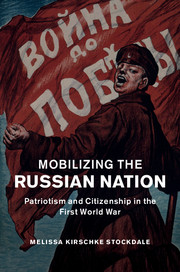‘Mobilizing the Russian Nation challenges the notion that Russians had no or insignificant national identity and anything resembling ‘healthy patriotism' and, for most authors who argue this thesis, this ‘failure' left a blank slate for Bolshevik militancy and dictatorship to become the new regime. On the contrary, Professor Stockdale shows Russian elites as very conscious of the importance of such national identity and patriotism, and as willing to devote considerable resources to their various projects even against the backdrop of the urgently competing priorities of munitions, manpower, and the national food supply. Although many of the ‘achievements' of these various projects were undermined by the exhausting, long war - above all any loyalty to the tsar as an embodiment of the nation - other practices were adapted and adjusted by the new Bolshevik leadership. Stockdale offers wonderful institutional histories of several imperial and public associations that played important roles in these multiple wartime nation-building projects.'
Mark Von Hagen - Arizona State University
‘Drawing on a dazzling diversity of original materials, Melissa Kirschke Stockdale upends conventional notions about how Russians experienced the First World War. Through her lucid, nuanced, and compelling analysis, Stockdale has masterfully recast our understanding of wartime patriotism's transformed and transformative role in the shaping of society and politics across a vast imperial state.'
Aviel Roshwald - Georgetown University, Washington DC
‘Mobilizing the Russian Nation examines the powerful crystallization of nationalism, citizenship, and patriotism in Russia in the course of the First World War. She challenges the idea that Russia's war effort was unpopular and that the common people failed to conceive of the war as a patriotic project. Rather, she shows ‘the endurance of soldiers and civilians, and the generosity of the entire population, through years of hardship and staggering losses'. She convincingly argues that the First World War transformed Russian civic life and public structures. In doing so, she is always attentive to comparative developments in other combatant societies. Her treatment is fluidly written and highlights the arc of individual lives - be it the high-born governor of St Petersburg, Count Ivan Tolstoy, or the semi-literatate peasant woman Maria Bochkareva. Readers interested in twentieth-century Russia, the First World War, and the global twentieth century will find much of interest in Melissa Kirschke Stockdale's very fine book.'
Peter Holquist - University of Pennsylvania
‘Stockdale's outstanding book overturns the received wisdom on Russian nationalism by convincing readers that even though the Russian state failed in a spectacular and violent way at the end of the First World War, the war nonetheless ‘played a significant role in the emergence of the modern Russian nation'. She persuasively shows that the attributes of the Russian national community forged during the First World War ‘would outlive the war and civil war, and be worked into Soviet renderings of Russian national identity'.'
Karen Petrone - University of Kentucky
‘How was Russian society mobilized during the Great War? What were the primary forms of patriotic mobilization? How did these efforts influence modern concepts of citizenship and nation in Russia? How has the war ‘sold' to different social, ethnic, and confessional groups? And why did Russian soldiers continue to attack the enemy even after the monarchy had collapsed? In order to answer these questions, Professor Melissa Kirschke Stockdale has studied government propaganda, patriotic discourse, civil society activity and charity, theological debates and national projects, and gender and memory politics. She draws on sources from archives in both Moscow and St Petersburg, and has applied new approaches and methods to interpret them. This innovative book will be important both for historians of Russia and for scholars who study the political and cultural history of the Great War.'
Boris Kolonitsky - European University, St Petersburg
'The book is a panoramic tour of war attitudes that crosses boundaries of class, gender, and (to a lesser degree) ethnicity. Her book is arranged thematically, with chapters on patriotic narratives, the place of the press, the role of the church, war relief, support for soldiers, the discourse of treason, and on patriotism in the revolutionary year of 1917.'
Joshua Sanborn
Source: The Journal of Modern History
'Melissa Stockdale’s richly textured book discusses how Russian - and, by extension, Soviet - identity was fashioned by the war, showing how a variety of very different groups were instrumental in creating a patriotic discourse that had an impact even after the war had ended.'
Peter Waldron
Source: The Slavonic and East European Review
'Stockdale’s work is highly effective in synthesizing a variety of sources to create a well-rounded picture of the concept of patriotism during the war. The result is a nuanced and balanced assessment of the issue, indicating that concepts of patriotism and citizenship were dynamic and fluid, but certainly present. As such, it is an important contribution to the growing body of literature on Russia’s Great War.’
Laurie S. Stoff
Source: European History Quarterly





